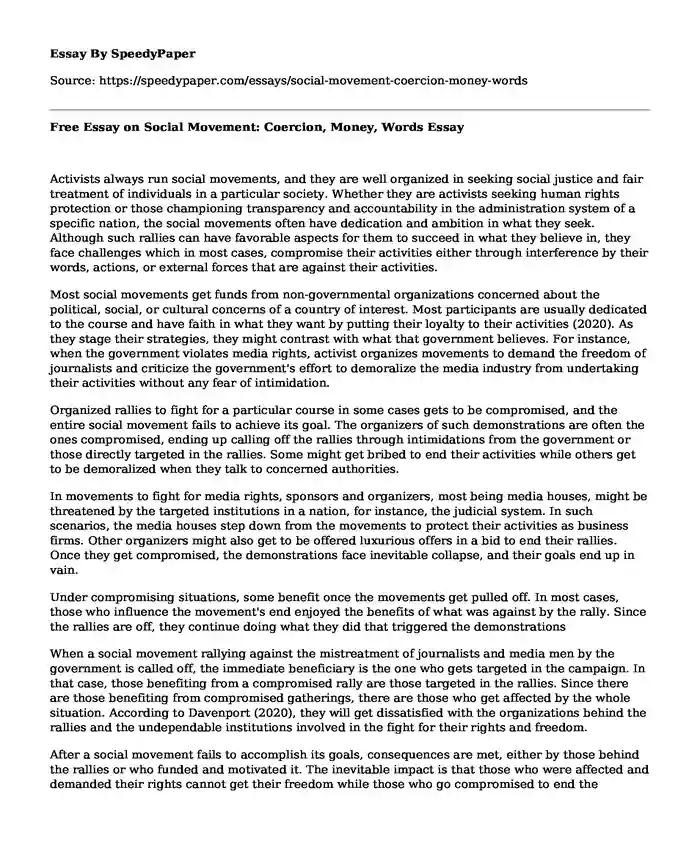
| Type of paper: | Essay |
| Categories: | Goal Government Motivation Social change |
| Pages: | 3 |
| Wordcount: | 651 words |
Activists always run social movements, and they are well organized in seeking social justice and fair treatment of individuals in a particular society. Whether they are activists seeking human rights protection or those championing transparency and accountability in the administration system of a specific nation, the social movements often have dedication and ambition in what they seek. Although such rallies can have favorable aspects for them to succeed in what they believe in, they face challenges which in most cases, compromise their activities either through interference by their words, actions, or external forces that are against their activities.
Most social movements get funds from non-governmental organizations concerned about the political, social, or cultural concerns of a country of interest. Most participants are usually dedicated to the course and have faith in what they want by putting their loyalty to their activities (2020). As they stage their strategies, they might contrast with what that government believes. For instance, when the government violates media rights, activist organizes movements to demand the freedom of journalists and criticize the government's effort to demoralize the media industry from undertaking their activities without any fear of intimidation.
Organized rallies to fight for a particular course in some cases gets to be compromised, and the entire social movement fails to achieve its goal. The organizers of such demonstrations are often the ones compromised, ending up calling off the rallies through intimidations from the government or those directly targeted in the rallies. Some might get bribed to end their activities while others get to be demoralized when they talk to concerned authorities.
In movements to fight for media rights, sponsors and organizers, most being media houses, might be threatened by the targeted institutions in a nation, for instance, the judicial system. In such scenarios, the media houses step down from the movements to protect their activities as business firms. Other organizers might also get to be offered luxurious offers in a bid to end their rallies. Once they get compromised, the demonstrations face inevitable collapse, and their goals end up in vain.
Under compromising situations, some benefit once the movements get pulled off. In most cases, those who influence the movement's end enjoyed the benefits of what was against by the rally. Since the rallies are off, they continue doing what they did that triggered the demonstrations
When a social movement rallying against the mistreatment of journalists and media men by the government is called off, the immediate beneficiary is the one who gets targeted in the campaign. In that case, those benefiting from a compromised rally are those targeted in the rallies. Since there are those benefiting from compromised gatherings, there are those who get affected by the whole situation. According to Davenport (2020), they will get dissatisfied with the organizations behind the rallies and the undependable institutions involved in the fight for their rights and freedom.
After a social movement fails to accomplish its goals, consequences are met, either by those behind the rallies or who funded and motivated it. The inevitable impact is that those who were affected and demanded their rights cannot get their freedom while those who go compromised to end the campaign will be acting to promote unjustified systems in a country. Their actions will also encourage discouragement from others who try to organize other rallies, which generally affects any future activism in a bid to seek justice.
In conclusion, once the social movements get compromised, their activities are disrupted and demoralized from participating in any other rallies. Demoralization impacts how people undertake their activities and generally their beliefs and trust in a just system to protect them.
References
Core.ac.uk. (2020). Retrieved from https://core.ac.uk/download/pdf/48840755.pdf
Davenport, C. (2015). How social movements die: repression and demobilization of the Republic of New Africa. New York: Cambridge University Press.21-38.
Springfield.edu. (2020). Retrieved from https://springfield.edu/sites/default/files/inline-files/2015-2016-student-handbook.pdf.
Cite this page
Free Essay on Social Movement: Coercion, Money, Words. (2023, Apr 20). Retrieved from https://speedypaper.com/essays/social-movement-coercion-money-words
Request Removal
If you are the original author of this essay and no longer wish to have it published on the SpeedyPaper website, please click below to request its removal:
- Essay Example with Ethical Theory Research
- How to Train Others at Work - HRM Essay Example
- Essay Example on How the Relationship Affects Healthiness
- Depiction of Mrs. Birling and Sheila in the Play, An Inspector Calls. Free Essay.
- Management Essay Example: Operation Consulting, Product and Service Design
- Caree Essay Example with Resume and Cover Letter of Marketing Manager
- Recruiting Workers, Training and Making Compensation
Popular categories




